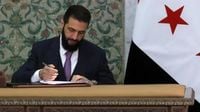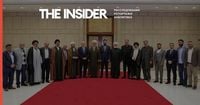In a historic shift for Syria, interim President Ahmed ash-Sharaa has announced the formation of a new government, marking a significant change in the country’s political landscape. The cabinet, which includes 23 ministers, is notable for its diversity, featuring representatives from various religious and ethnic minorities, including the first-ever female minister in Syrian history.
Hind Kabawat, a long-time opponent of the Assad regime and a member of the Christian minority, has been appointed as the Minister of Social Affairs and Labor. Her inclusion is seen as a step towards greater inclusivity in a country long dominated by the Assad family and their supporters. "We are witnessing the birth of a new stage in our national path," ash-Sharaa stated during the cabinet announcement ceremony at the presidential palace.
The new government, which ash-Sharaa has termed the "government of accord and transition," aims to symbolize the changes in Syria following the ousting of Bashar al-Assad. This transition came after the regime fell on December 8, 2024, when armed opposition forces seized control, leading to the release of thousands of political prisoners and the capitulation of the Syrian army.
In the wake of the regime’s collapse, ash-Sharaa, who previously led the Hayat Tahrir al-Sham (HTS) group, was appointed as the interim president in January 2025. He has promised to form an inclusive transitional government and conduct free and fair elections, with the transitional period expected to last up to four years.
The newly formed cabinet reflects a commitment to representation, with ministers from the Alawite and Druze communities, although notably absent are representatives from the Kurdish minority. Yarub Badr, an Alawite, has been appointed Minister of Transport, while Amgad Badr, a Druze, has taken the role of Minister of Agriculture. The cabinet is expected to address the reconstruction of Syria, combat corruption, and strengthen the economy.
In addition to the appointments, two new ministries have been established: the Ministry of Youth and Sports and the Ministry of Emergency Situations. Raed al-Saleh, the head of the White Helmets civil organization, has been named Minister of Emergency Situations. The introduction of a sports ministry is particularly significant, as ash-Sharaa emphasized the importance of youth in the nation’s future.
Despite the positive steps towards inclusivity, the new government faces significant challenges. A recent uprising among Alawites, which was suppressed by the Ministry of Defense, resulted in over 110 deaths according to the UN, raising concerns about the stability of the new administration. Furthermore, the transitional government has yet to navigate the complexities of international relations, as Western leaders have indicated that any lifting of sanctions will depend on the new government’s commitment to reflecting Syria’s ethnic and religious diversity.
As the interim government sets its sights on reconstruction and reform, ash-Sharaa has reiterated his commitment to building a strong and stable state that guarantees the interests of all citizens. He assured the Syrian people that the new government would prioritize their needs and work towards a brighter future.
In his remarks, ash-Sharaa acknowledged the difficulties ahead but expressed optimism about the path forward. "We are announcing the formation of a government of accord and transition, which will take on reconstruction and carry out reforms," he stated. The new cabinet represents a crucial step towards establishing a political framework that could lead to lasting peace and stability in Syria.
As the world watches closely, the actions and policies of ash-Sharaa’s government will be pivotal in determining the future of Syria. The transitional period not only seeks to address immediate humanitarian needs but also aims to lay the groundwork for a democratic process that respects the rights of all Syrians.
The international community remains cautiously optimistic, with many hoping that this new government will facilitate a genuine dialogue among the diverse groups within Syria. As the country embarks on this new chapter, the focus will undoubtedly be on how effectively it can navigate the complexities of its diverse society while fostering unity and resilience.
With the Assad family now in exile in Moscow, the future of Syria is uncertain, but the establishment of this new government represents a significant turning point. The eyes of the world are now on Syria, waiting to see if this government can fulfill its promises and lead the nation towards a peaceful and prosperous future.







